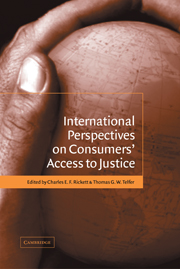Book contents
- Frontmatter
- Contents
- List of contributors
- Preface
- Table of cases
- Table of statutes
- 1 Consumers' access to justice: an introduction
- Part I Perspectives on consumers' access to justice
- Part II Issues in contract and tort
- Part III Services and the consumer
- Part IV Consumer bankruptcy law
- Part V Procedure and process issues
- Part VI Conflict of laws issues
- 14 Adapting international private law rules for electronic consumer contracts
- 15 Waving goodbye to conflict of laws? Recent developments in European Union consumer law
- Index
14 - Adapting international private law rules for electronic consumer contracts
from Part VI - Conflict of laws issues
Published online by Cambridge University Press: 11 July 2009
- Frontmatter
- Contents
- List of contributors
- Preface
- Table of cases
- Table of statutes
- 1 Consumers' access to justice: an introduction
- Part I Perspectives on consumers' access to justice
- Part II Issues in contract and tort
- Part III Services and the consumer
- Part IV Consumer bankruptcy law
- Part V Procedure and process issues
- Part VI Conflict of laws issues
- 14 Adapting international private law rules for electronic consumer contracts
- 15 Waving goodbye to conflict of laws? Recent developments in European Union consumer law
- Index
Summary
Introduction
The role of international private law is often regarded as being ‘derived from a desire to do justice’ for parties involved in cross-border disputes. The onset of electronic commerce and the increasing prevalence of electronic contracts pose new challenges for international private law. Entering into a contract by electronic means enables parties who are domiciled (or have a place of business) in different jurisdictions to use the Internet or e-mail for the purchase and sale of goods and services or a combination of both. Whilst issues of privacy and security are undoubtedly of extreme importance to consumers when conducting their transactions online, other aspects of the electronic consumer contract are just as important. From an international private law perspective, rules of jurisdiction and the law to be applied to online consumer contracts have been the subject of considerable debate.
International private law and electronic commerce
In a paper published in 1997, Vaughan Black asserted that international private law need only be considered in one-off cases when cross-border matters arise. Given today's globalisation of markets and finance, combined with increased co-operation between governments internationally, cross-border cases are by no means exceptional. Rules and principles of international private law need to be considered more often, especially if parties to a contract have not agreed which law is to apply to that contract, or if aspects of their agreement are in dispute.
- Type
- Chapter
- Information
- International Perspectives on Consumers' Access to Justice , pp. 359 - 383Publisher: Cambridge University PressPrint publication year: 2003



